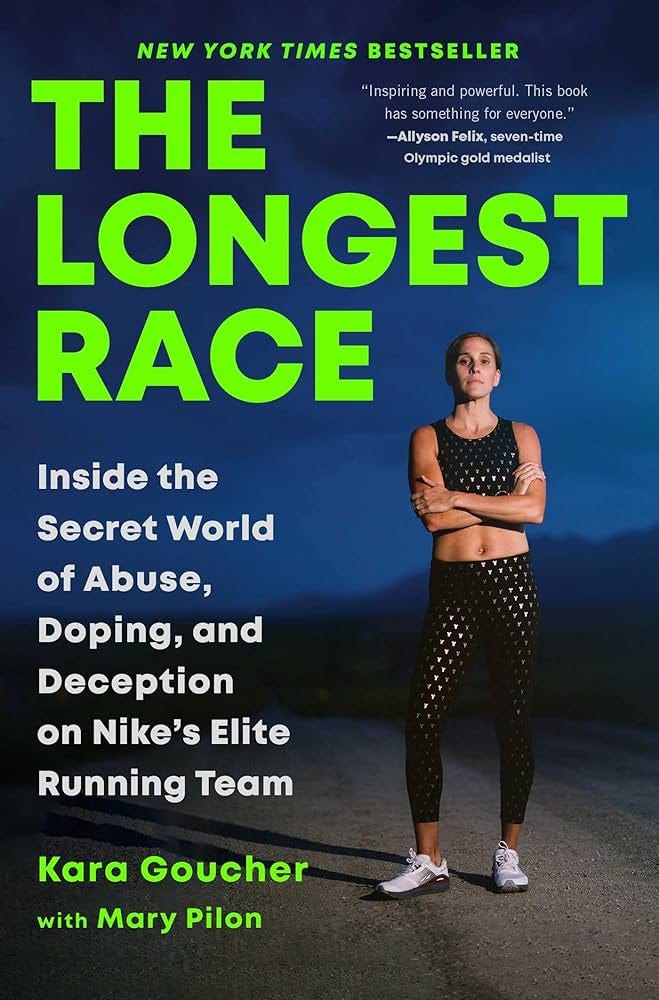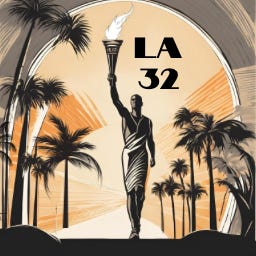What Nike Won’t Answer For & 5 Other Essential Stories
How Nike escaped accountability, a running journal, and the ultrarunner who made 200s mainstream.
Running, like reading, is best when shared.
This week, I’m diving into 6 fascinating stories about movement, endurance, and culture. From Anton Krupicka’s running journals to the impossible quest for an all-American BBQ scrubber, here are 6 things I’ve been reading, listening to, and watching.
6. Anton Krupicka reflects on 30 years of running journals (Auteur Sportif)
A quiet, delightful video from
and Auteur Sportif of Anton Krupicka and his running logs. Krupicka was one of my generation’s first ultramarathon stars, winning the Leadville 100 twice and podiuming Western States. He’s also a deeply thoughtful and reflective writer.“For me, within two months of becoming a runner, I started documenting it. And I think that was just a sign of how important it was in my life, you know? This is something that’s meaningful to me, so I’m going to write it down.”
Krupicka’s journals are a living record of decades of training, injuries, and personal evolution. Watch him chuckle as he catches a stress-fracture diagnosis sketched in pen, alongside notes on world-historical events. I’ve written about the value of a life recorded on paper; Krupicka shares that ethos.
5. The Puzzle of The All-American BBQ Scrubber (Search Engine)
What would it take to start making things in America again?
investigates in a fun case study. Featuring engineer and YouTuber Destin Sandlin, the podcast tells the story of his attempt to design, produce, and sell a grill brush entirely in America.While the tale of this gizmo is fascinating, it is the imperative to figure out ways to kickstart American manufacturing. Outsourcing manufacturing has made Americans vulnerable to supply issues. Even worse, we’re quickly losing the knowledge to tool the machinery required to build in the states. Once that’s gone, as the philosopher Bill Paxton said, it’s game over, man.
Side note: This got me thinking—could we ever bring shoe manufacturing back to the U.S.? Most major brands like Nike, Adidas, Brooks, and Hoka outsource their production to companies in Vietnam, China, and Indonesia. Indeed, it’s a mistake to even call these brands “shoe companies.” They are, in truth, marketing and design firms that sell the idea of shoes. Actual manufacturing is done by third-party firms located across the Pacific.
Side side note: To my knowledge, New Balance is the only major shoe brand that still makes a selection of their shoes in the USA. I’d love to explore more, but it would take effort. Would this be a topic you’d like a full deep dive on? Let me know.
4. Kara Goucher’s The Longest Race
This week I spent my nights blitzing through Kara Goucher’s 2023 memoir. Detailing her entire running career to date, Goucher lays emphasis upon her time with the Nike Oregon Project under the coaching of Alberto Salazar.
Goucher’s allegations of abuse by Alberto Salazar and her more nebulous accusations of doping on the Nike-funded team got headlines when the book was published two years ago.1
Her account is disturbing in the extreme. And just as unsettling are the systematic weaknesses her memoir reveals within the running sponsorship model, flaws that could continue to leave athletes vulnerable to abuse.
The first issue relates to contracts. Sponsored runners are often the faces of their brands, but most are not actually employees. Instead, sponsorships consider athletes as independent contractors without employer-provided health insurance, retirement benefits, or job security.2
Goucher’s success on the track led her to negotiate a relatively lucrative 6-figure deal with Nike, but it still left her vulnerable to exploitation. Capital is going to capital. When Goucher became pregnant, the company enforced contract stipulations that she complete a certain number of races within a set time period or forfeit a sizable chunk of her paycheck for the remainder of her term. And so Goucher began training mere days post-delivery.
A more surprising problem was the lack of accountability over Salazar and the Nike Oregon Project, which operated with minimal oversight, effectively functioning as an extension of the CEO’s office.
The lack of oversight over Salazar meant there was no clear escalation pathway for athletes with concerns. In most corporate structures, layers of management ensure that work is done well and on time—but also that misconduct by managers can be reported and addressed.
Incredibly, the only escalation path available to Oregon Project athletes appears to have been Nike CEO Mark Parker himself. It is then unsurprising that an abusive culture escalated over time. (Honestly, the entire multi-million-dollar team sounds like it was cobbled together over beer and whiskey by Salazar and several semi-sloshed Nike execs at the Wild Duck Cafe.)
Salazar has been held responsible, but Nike is absolutely accountable for the alleged abuse. As of this writing, however, no lawsuits have been filed directly against Nike related to NOP abuse allegations, nor have any fines or penalties been imposed on the company by any regulatory bodies. The company remains a powerhouse in elite running and has largely moved on without financial, legal, or structural consequences.
3. Stories from the 1932 Los Angeles Olympics
If you enjoyed Malcolm Gladwell’s two podcast series on Hitler’s Olympics and the sprinters of the 1968 Games, you’ll love
’s short- and long-form stories about the Tenth Olympiad: the 1932 Olympic Games in Los Angeles.The series is well researched and surprisingly wide-ranging, from athlete profiles to explorations of the politics and culture around the competitions. I’ve been trying to catch up on the series since discovering it on Substack. Thus far my two favorite articles are this profile of Babe Didrikson’s multiple medal attempts and a piece on the German track athletes who competed right as Adolf Hitler’s National Socialist party was swept into power.
2. Best running socks
runs down the trendiest socks on the market right now. I’m partial to the Near Earth sock, which Townsend highlights. It’s been my go-to for everything from muddy trail 50Ks to spicy track 5Ks. I have not tried them yet, but the Courier Hi-Fi Socks also looks rad. What’s your favorite sock for running, hiking, or cycling?
1. Inside the mind of the woman who built America’s 200-mile races (Running Sucks)
I was chatting the other day with a friend who casually dropped they were spending the weekend crewing someone for an ultramarathon. “What distance?” I asked. “50-mile? 100K?” “No,” they replied. “200 miles.” I nearly pulled a muscle, my eyebrows raised so high.
200s have become popular among the ultra set and no one has done more to evangelize the distance than
, owner of the Destination Trail series which organizes the Triple Crown of 200-mile races.Featuring plenty of verbatims,
tells Burt’s 200s origin story, as well as her world-record streak of 200 straight days of 50K runs.Tweets of the week
Parting thought
"Power concedes nothing without a demand. It never did and it never will. Find out just what any people will quietly submit to and you have found out the exact measure of injustice and wrong which will be imposed upon them, and these will continue till they are resisted with either words or blows, or with both. The limits of tyrants are prescribed by the endurance of those whom they oppress."
— Frederick Douglass
That’s this week’s lineup—tell me, which story stuck with you the most?
While Goucher’s allegations have not led to a criminal conviction, they were part of broader investigations into Salazar’s coaching practices that contributed to his lifetime ban from coaching by the U.S. Center for SafeSport.
Some running sponsorship deals do include healthcare and other benefits. Goucher’s Nike contract did not.













Thought you might enjoy…
https://open.substack.com/pub/lisablume/p/they-race?r=jzve5&utm_medium=ios
Outside of track spikes and killshots, Nike's products never really appealed to me, but after reading Goucher's book, I donated these items and any free race shirts that also happened to be made by Nike. While the brand is much larger than Salazar, I can't help but still feel uncomfortable supporting their athletes when the brand stood by him at every turn. These feelings came back up recently when first Nikki Hiltz mentioned Kara's experience with Nike as one of the reasons they chose to leave Coach Mike Smith once it became clear that they would have to become a Nike athlete to do so. Then more recently, when Riley Brady announced they would be sponsored by Nike, a brand whose shoes have allowed them to have two of the most recent game-changing performances, I would not say I can never forgive Nike, but I feel like they haven't even tried to regain our trust as fans and consumers.